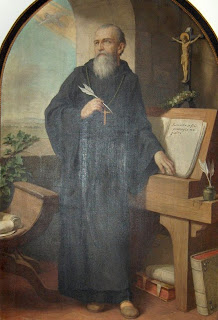Feast Day: December 6
St. Nicholas, also known as Nicholas of Myra, was a Christian bishop who lived in the Roman province of Lycia, in what is now modern-day Turkey, during the 4th century. He is one of the most beloved and widely venerated saints in both the Eastern Orthodox and Western Christian traditions. St. Nicholas was born around the year 270 AD in the city of Patara, in Asia Minor. He came from a wealthy family and was raised in the Christian faith.
St. Nicholas is renowned for his extraordinary acts of kindness, generosity, and compassion. One of the most famous stories associated with him tells of how he secretly provided a dowry to three poor sisters to save them from a life of destitution and potential slavery. According to the legend, he threw bags of gold through the girls' window at night, which landed in stockings or shoes drying by the fireplace, giving rise to the tradition of hanging stockings for Christmas.
In addition to his charitable acts, St. Nicholas was known for his strong faith and commitment to the Christian Church. He was consecrated as Bishop of Myra and became a defender of the Christian faith during a time of persecution. St. Nicholas was imprisoned and suffered for his beliefs but remained steadfast in his commitment to Christ.
St. Nicholas died on December 6, 343 AD, and his death is commemorated on this date in the Christian calendar. He was interred in the Church of St. Nicholas in Myra, which became a popular pilgrimage site. Over the centuries, devotion to St. Nicholas spread throughout Europe, and he became the patron saint of various groups and causes, including sailors, children, and merchants.
Patronage:
St. Nicholas is the patron saint of:
Children: St. Nicholas is known for his care and love for children, which is why he is often associated with the modern figure of Santa Claus.
Sailors: Due to his connection to the sea and maritime miracles attributed to him.
Merchants and Shopkeepers: His reputation for generosity and protection of those in need made him a natural patron for merchants and traders.
Repentant Thieves: St. Nicholas is believed to have intervened on behalf of thieves who repented of their crimes.
Feast Day:
St. Nicholas's feast day is celebrated on December 6th in the Western Christian tradition and on December 19th in the Eastern Orthodox tradition. These dates commemorate his death and his entry into heavenly glory.
Prayer to St. Nicholas:
O Holy St. Nicholas,
You who gave to the poor and protected the innocent,
Intercede for us before the throne of God.
Guide us in acts of charity and selflessness,
That we may follow your example of love.
You who watched over sailors in the storm,
Be our protector in times of danger and uncertainty.
Lead us safely through the tempests of life,
And help us find our way to the shores of peace.
Bless our children with your loving care,
And grant us the wisdom to nurture their faith.
Strengthen our hearts, O Nicholas,
To be beacons of hope and kindness in this world.
Amen.
Reflection:
St. Nicholas's life reminds us of the transformative power of selfless love and generosity. In a world often marred by selfishness and materialism, his example encourages us to look beyond our own needs and reach out to those less fortunate. Whether it's through acts of kindness, charity, or simply lending a helping hand to those in need, we can all strive to embody the spirit of St. Nicholas and make the world a better place for others. His unwavering faith and dedication to his beliefs also serve as a reminder that faith can sustain us through life's challenges, and that our convictions should guide our actions and choices. St. Nicholas continues to inspire countless people to this day, urging us to be a source of light and hope in the lives of those around us.
Christ is the reason why we celebrate Christmas. So, let us put Christ back into Christmas for this is the greatest gift we can have this season.















